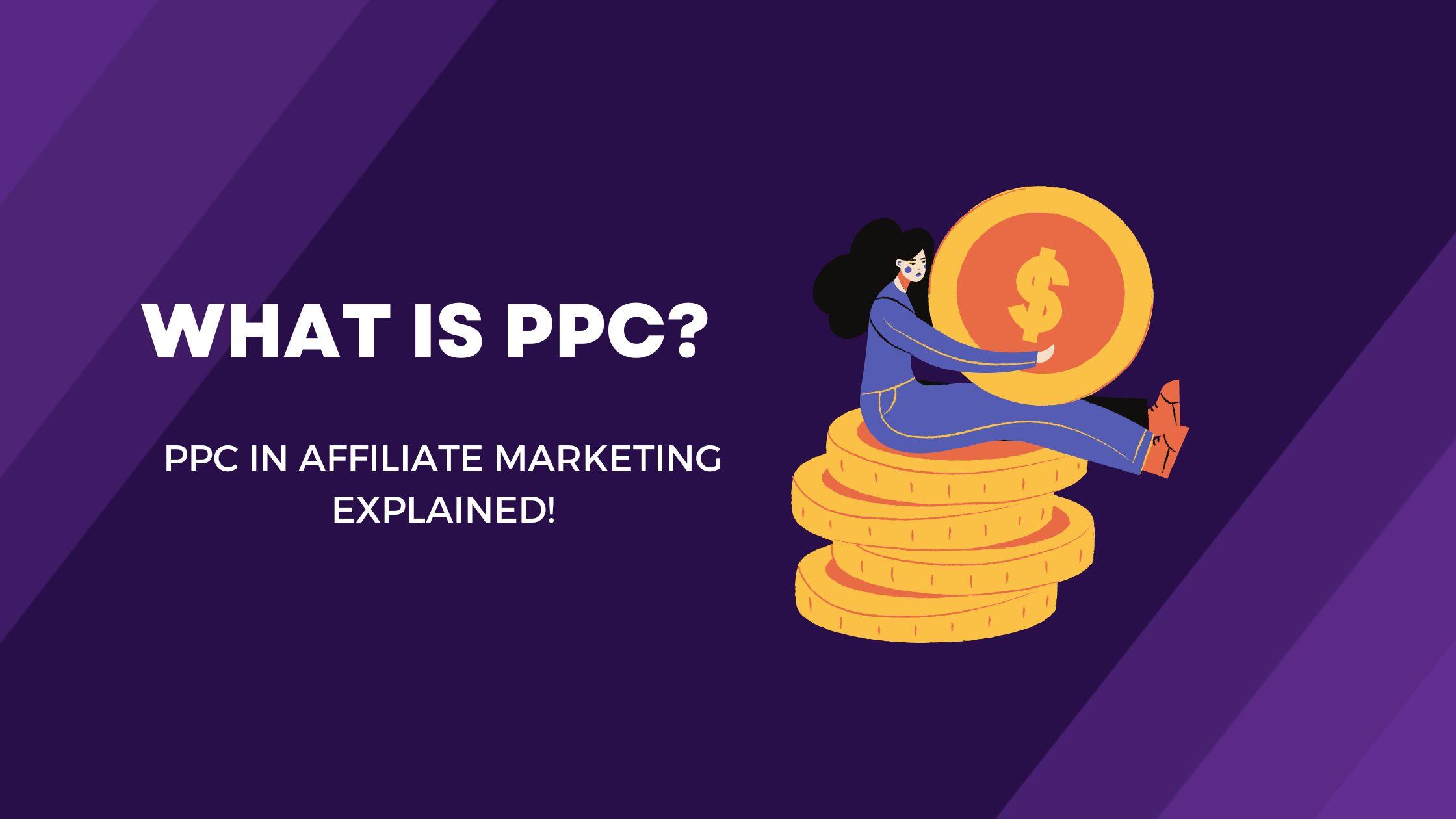What Is PPC In Affiliate Marketing? The Fastest Way To Generate Sales
Are you finding free promotion methods to slow or looking to take your affiliate marketing earnings to the next level?
Let’s introduce you to the power of PPC advertising!
This guide will unveil proven strategies to boost ROI and maximize your earning potential through PPC in affiliate marketing.
Pay-per-click (PPC) advertising is a powerful tool for businesses looking to increase their online visibility and drive sales.
Regarding affiliate marketing, PPC can be an incredibly effective way to boost earnings and drive conversions.
By targeting specific audiences and relevant keyword research, PPC will help affiliates increase their reach and drive more qualified traffic to their offers.
Whether you’re new to affiliate marketing or a seasoned pro, learning how to create effective PPC campaigns is a skill you can’t live without.
Why PPC Is Important For Affiliates?
PPC is important for affiliates because it allows them to drive targeted traffic to their affiliate offers and earn commissions for every click or conversion. By targeting based on factors including geographic location, interests, and search queries. This will result in a higher click-through rate (CTR) and better conversion rates, leading to more revenue for the affiliate.
What Is Pay-Per-Click Or PPC?
Pay-per-click (PPC) advertising is a form of online advertising where advertisers pay each time a user clicks on one of their ads.
In affiliate marketing, the practice of PPC drives traffic and attracts leads to affiliate offers, products, or services.
PPC can be learned and practiced on many different platforms, some of the most popular being Google Ads, Facebook Ads, and Bing Ads.
By using PPC ad copy, marketers can effectively increase their reach, drive more qualified traffic to their offers, and boost their earnings.
How PPC Works?
PPC, or pay-per-click, is a form of online advertising where advertisers pay each time a user clicks on one of their ads. The process typically works as follows:
- Platform selection: Advertisers choose the platforms where they want their ads to appear, such as Google, Bing, Facebook, etc.
- Creating ads: Advertisers create ads that they want to display to their target audience.
- Bidding on keywords: Advertisers bid on specific keywords or phrases that they think their target audience will search for. When someone searches for those keywords, the ads may appear.
- Ad auction: When a user enters a search query, the search engine runs an auction to determine which ads will appear. The auction takes into account factors like bid amount, ad relevance, and ad quality.
- Ad placement: The winning ads are displayed in the search results or on other websites, and advertisers pay for each click on their ad.
- Ad tracking and optimization: Advertisers track their ad performance and make changes to improve their ad targeting, ad copy, and bid amounts to get the best results for their advertising spend.
Overall, PPC is a way for advertisers to reach their target audience with relevant and valuable ads, while paying only when someone clicks on their ad.
Benefits of PPC Marketing
There are many benefits of PPC marketing including:
Targeted traffic: Pay per click programs affiliates to target specific audiences and keywords, which can help increase the chances of making a sale.
Scalability: PPC allows many affiliate marketers to scale up or scale down their campaigns as needed.
This flexibility is crucial for affiliate marketers who want to grow their business and increase their earnings.
Cost-Effective: PPC affiliate programs can be a cost-effective way to drive traffic. Since you only pay for clicks, no budget is wasted on impressions or views.
Measurable And Trackable: PPC platforms provide detailed analytics and metrics that allow marketers to track and analyze the performance of their campaigns.This makes it easy to identify which ads are performing well and which ones need to be tweaked.
Quick Results: PPC campaigns can be set up and live within a day and can start driving traffic and conversions within hours.
This is useful for affiliate marketers who want to test the performance of a product or service before committing to a long-term campaign.
Increased Reach: PPC allows affiliate marketers to reach a larger audience and promote their offers to people who are not actively searching for the product or service they are promoting.
Brand Awareness: If you’re an affiliate, PPC campaigns can help increase the visibility and awareness of the brand and products, which can lead to more conversions in the long run and earn money.
When you think about the benefits, learning PPC is essential for affiliate marketers to increase their reach, drive qualified leads and boost earnings.
Pay-Per-Click Platforms
Here are some platforms that allow the creation of PPC campaigns;
Google Ads
Google Ads is the most popular PPC platform for affiliate ads, and it offers a wealth of resources to help you set up and optimize your campaigns. Google’s Help Center, tutorials, and webinars are a great place to start learning how to write compelling PPC pages.
Bing Ads
Bing Network Ads is another great pay-per-click platform, and it also offers a variety of resources to help you set up and optimize your campaigns. Bing’s Learning Center is a great place to start.
Facebook Ads
Facebook Ads is an elite platform for promoting affiliate offers to a targeted audience. Facebook provides a wealth of resources to help you set up and optimize your campaigns, including a detailed guide to creating effective ads.
These resources can provide valuable information and tools to help you with setting up, optimizing, and analyzing your PPC campaigns, they will help you to understand the best practices and new trends in PPC and how to implement them in your affiliate marketing strategy.
Types Of Pay Per Click Campaigns
There are several different types of PPC campaigns that affiliate marketers can use to promote their offers, these include;
Search Engine Optimization (SEO):
This type of PPC campaign is designed to increase the visibility of an affiliate site on search engine results pages (SERPs).
It involves optimizing the affiliate website’s content and structure to make it more easily discoverable by search engines.
Providing valuable content can help affiliate marketers drive more organic traffic to their website, which can in turn increase their chances of making a sale.
Display Advertising
This type of PPC campaign involves creating banner ads that are displayed on websites and apps.
Affiliate marketers can use display advertising to reach a larger audience and promote their offers to people who are not actively searching for the product or service they are promoting.
Social Media Marketing
This type of PPC affiliate marketing campaign involves promoting affiliate offers on social media platforms, such as Facebook, Instagram, Twitter, etc.
Social media marketing can be an effective way for affiliate marketers to reach a targeted audience and drive conversions.
Shopping Ads
This type of PPC campaign allows the advertiser to display their products directly on the SERP, which allows users to see the price and availability of the product, as well as read reviews.
This type of ad is especially useful for e-commerce.
Video Advertising
This type of PPC campaign allows advertisers to run video ads on platforms such as YouTube, TikTok, and Facebook.
These ads can be targeted to specific demographics and interests and they can drive conversions by providing more detailed and engaging information about the product or service.
Each type of campaign has its own advantages and disadvantages, and affiliate marketers should choose the one that best suits their goals and target audience.
Tips On How To Create A Successful PPC Campaign For An Affiliate Program
Here are some tips on how to create a successful PPC campaign for an affiliate program:
Understand Your Audience
Understand who your target audience is and what they are looking for. Conduct market research to identify the keywords and phrases that they use when searching for products or services related to your affiliate program.
Choose The Right Platform
Choose the right PPC platform for your campaign. Different platforms have different targeting options and ad formats, so it’s important to choose one that aligns with your goals and target audience.
Create Compelling Ad Copy
Create compelling ad copy that speaks to your target audience’s needs. Use keywords and phrases that are relevant to your affiliate program and make sure your ad copy is clear, concise, and to the point.
Use Eye-Catching Images And Videos
Use images and videos that are eye-catching and relevant to your affiliate program. This can help increase the chances of your ad getting noticed and clicked on and increase the number of website visitors.
Use A Clear Call To Action (CTA)
The most successful marketers always use a clear call to action (CTA). This encourages users to take the next step, whether it be visiting your affiliate marketing sites, signing up for your newsletter, or making a purchase.
Track And Analyze Your campaign
Track and analyze your campaign’s performance regularly. Use the data and analytics the PPC platform provides to identify which ads are performing well and which ones need to be tweaked.
Test And Optimize
Test different ad variations and optimize your campaign regularly. Providing ads on your site will help you identify what works and what doesn’t, so you can improve your ROI over time.
Utilize Negative Keywords
Utilize negative keywords to avoid targeting irrelevant keywords, decreasing your chances of getting unwanted clicks and increasing your conversions.
By following these tips, you can create a successful PPC campaign for your affiliate program and drive more targeted traffic to your affiliate page offers, increase conversions, and boost your earnings.
FAQs
Is PPC good for affiliate marketing?
Yes, running PPC campaigns can be highly effective for affiliate marketing. It assists in targeting a specific audience, increases brand awareness, and boosts the ROI of campaigns.
How to make money with PPC?
Promoters make money with PPC by displaying ads on search engines, social media platforms, websites, and mobile apps. These ads generate leads, sales, and conversions which leads to money for businesses and affiliates
What is the best pay-per-click site?
The best pay-per-click site depends on the industry, target audience, and business budget. The most popular options include Google Ads, Bing Ads, Facebook Ads, and Instagram Ads.
How do you get paid for people clicking on your link?
You can get paid for people clicking on your affiliate link by using pay-per-click affiliate marketing. Thes types of campaigns often pay a reward for introducing leads regardless if a sales is made or not.
Should I learn PPC or SEO?
Both PPC and SEO referral programs can effectively drive traffic and generate revenue for a business, and the best option depends on your specific goals and resources. It’s recommended to learn both, as they complement each other, and give a holistic approach to digital marketing.
See our top recommended PPC Course. Legendary Marketer
Or our top recommended SEO courses – Matt Digity or Greg Jeffries
What are PPC qualifications?
PPC qualifications are certifications, courses, and programs that can help you learn and master the skills required for PPC advertising, such as Google Ads Certification, Bing Ads Accreditation, Facebook Blueprint Certification, and various PPC certification courses.
How do I get into PPC marketing?
To get into PPC marketing, you can start by learning the basics through online courses, certifications, and reading relevant literature, gain experience by managing small campgrams positions at digital marketing agencies.
How much is a click worth?
The cost per click (CPC) can vary widely and depends on factors such as industry, competition, targeting, ad placement, and keywords; it can range from a few cents to several dollars. It’s important to note that the CPC or cost per action is not a fixed value and can change depending on the campaign.
Is Facebook ads a PPC platform?
Yes, Facebook ads are a form of PPC (pay-per-click) advertising, where you pay for each click on your ad or a set number of impressions. You can target specific demographics and interests, and track your performance using analytics provided by Facebook.
What is PPC on Amazon?
PPC on Amazon is the use of Amazon’s pay-per-click advertising platform, called Amazon Advertising, to promote products on Amazon search results and product detail pages. It allows businesses to bid on keywords and create sponsored products or sponsored brand ads to drive more visibility and sales for their products on Amazon.
Recap: The Power Of PPC In Affiliate Marketing
In conclusion, PPC in affiliate marketing is like a like a superhero and sidekick duo. Together they are a match made in heaven and can help you boost earnings and reach new heights.
Pro tip: Don’t be afraid to get creative, test different strategies, and have fun with it! After all, the sky’s the limit when it comes to the power of PPC marketing.
More articles you’ll love:
- Ai Tools Directory - August 8, 2023
- Mastering Affiliate Marketing: Your Complete Guide to Promotion Strategies - May 26, 2023
- Top Health Affiliate Programs: The Ultimate Guide for Health and Wellness Bloggers - May 23, 2023




